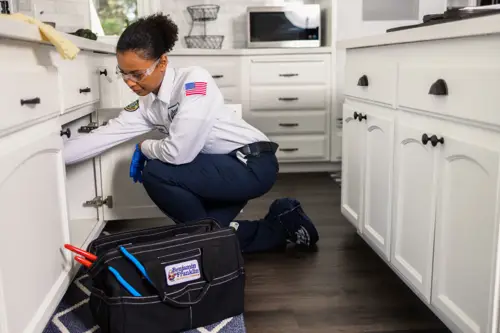 What is considered a plumbing emergency?
What is considered a plumbing emergency?
You know how plumbing problems always seem to pop up at the worst possible times? We’ve all been there: staring at a leak or clog at midnight, wondering if we should call an emergency plumber right away or if it can wait until morning.
Let me walk you through how to figure out what’s really an emergency and what can wait so you don’t end up spending money on emergency services when you don’t have to.
Questions to Ask
When you’re facing a plumbing problem, here are the key questions you need to ask yourself:
- Can this wait until regular business hours? Emergency plumbing services are costly. While some issues need immediate attention, things like a slowly draining sink or a minor toilet clog might be annoying but won’t cause damage if they wait until morning. Save that emergency call (and money!) for when you really need it.
- Do you have access to a water shutoff valve? Most plumbing fixtures have their own shutoff valves nearby, and they’re your best friend in a crisis. If you stop the water supply to the problem area, you might buy yourself time to schedule a regular service appointment instead of paying those after-hours rates. This is a good solution and can prevent minor issues like faucet leaks from becoming an emergency.
- Is there a risk of significant damage if you wait? This is where you need to be really honest with yourself. Water damage to walls, floors, or ceilings isn’t something to mess around with. That’s the kind of problem that gets exponentially worse (and more expensive) the longer you wait. If there’s a risk of structural damage or mold growth, that bumps it up to emergency status.
- Could this be a more significant issue beyond your control? Sometimes, what looks like your problem isn’t your problem. Before you panic, check if your neighbors are having similar issues. If they are, you might be dealing with a utility company problem, so you’ll want to contact them first rather than a plumber.
Emergency or Not? Common Plumbing Problems
Now, let’s break down some common plumbing problems and whether they count as emergencies. A burst pipe? That’s definitely an emergency. You need to shut off your main water valve right away and get a plumber there ASAP before your home turns into a swimming pool.
Many people don’t realize that burst pipes often happen during cold snaps, so if temperatures drop below freezing, keep your faucets dripping slightly to prevent this nightmare scenario.
Leaking pipes are trickier. Some minor leaks can wait, but if you’ve got water pooling anywhere, that needs immediate attention. You can try temporary fixes like duct tape or putty while you wait for help, but don’t rely on these long-term. One thing to watch for: if you notice water stains on your ceiling or walls, even if they’re dry at the moment, that’s a red flag that deserves prompt attention. These stains often indicate a leak that’s been happening for a while, and the longer you wait, the worse the repair might become.
When it comes to overflowing toilets, you’ll want to quickly turn off that valve near the base and grab your plunger. If you can’t get it under control or it keeps happening, it’s time to call in the pros. And here’s something really important: Don’t mess around if you smell gas (it smells like rotten eggs) or suspect a gas leak. Get out of your house immediately and call for help from somewhere safe. Don’t even think about using any electrical devices.
If you DO have a plumbing emergency, here’s what to do while you wait for emergency plumbing services to arrive.
Creating Your Emergency Plumbing Kit
It’s wise to prepare for these situations by assembling an emergency plumbing kit. Think of it as your plumbing first aid kit.
Here’s everything you’ll want to include:
- A good-sized five-gallon bucket. You’ll need this to catch water from leaks and carry your tools around. Plus, it also comes in handy for all sorts of other household emergencies.
- Plumber’s putty and duct tape. These are your temporary heroes when you need to seal up a small leak until professional help arrives. They won’t fix things permanently, but they can definitely save your bacon in a pinch.
- Two different types of plungers. Yes, you really do need both! A toilet plunger and a sink plunger are designed differently, and having the right tool for the job makes a huge difference when you’re dealing with clogs.
- Essential tools, including a pipe wrench, pliers, and various screwdrivers, will help you handle simple fixes and adjustments when needed. Make sure to get good-quality tools that won’t break when you really need them.
- A decent drain snake. Sometimes, a plunger just won’t cut it, and that’s when you need something that can reach deeper into the pipes to clear those stubborn clogs.
- A reliable flashlight. With fresh batteries – because Murphy’s Law says plumbing emergencies love to happen in the darkest corner of your house at the worst possible time.
- Protective gear. Get some nitrile gloves and safety goggles. Trust me, you’ll want these when dealing with any plumbing mess. Plumbing work can get pretty gross, and you’ll want to protect both your hands and eyes.
- A stash of old towels or rags. Keep these separate from your good towels and use them specifically for soaking up leaks and spills during plumbing emergencies.
Here’s the bottom line: if you’re in Lakeland, FL, and you’re wondering whether your plumbing problem needs immediate attention, feel free to give us a call at Benjamin Franklin Plumbing. We provide professional emergency plumbing services; we’ll be there when you need us, and if there’s any delay, it’s YOU we pay!